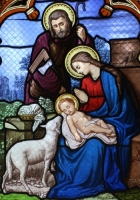
| 31 December |
• yesterday • tomorrow |
| Optional Memorial of Saint Sylvester I, Pope |
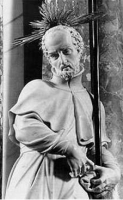
• Jean-François Régis
• John-Francis Regis
• John Francis Regis
• Johannes Frans Régis
2 July (Jesuits)
Son of a wealthy merchant. Educated at the Jesuit college at Beziers, and at Cahors, Le Puy, Auch, and Tournon. Joined the Jesuits at age 18. Preacher. Catechist who was so good that children he taught helped bring their parents back to the Church. Ordained at age 34. Worked with plague victims in Toulouse, France. Taught at Pamiers.
His skill at preaching caused him to be sent as evangelist to provinces that had fallen to the Huguenots following the Edict of Nantes, places where many had abandoned the Church. Not known for a polished style or appearance, his simple method of preaching the Truth, and his willingness to work for the poor, converted crowds of farmers, workers, and country folk. When pressed about his image he replied, "The rich never lack confessors." He lived off apples, black bread, and whatever came to hand, preferring to spend his time preaching, teaching, and hearing confessions.
Established hostels for prostitutes, whom he called "Daughters of Refuge", who wished to leave the business. He was often assaulted for his trouble. Helped a group of country girls stay away from the cities by establishing them in the lacemaking and embroidery trade, an area of which he a patron saint.
Established the Confraternities of the Blessed Sacrament; to the society women he offered the "gift" of a few hungry mouths to feed, while to others he sent notes like,
"Sir, you will provide food for the poor people who names are listed below, and you will give them six sous for their lodging. If you are unable to provide them with food, you will give them a further six sous so that they may buy it themselves."
They did. Established a granary for the poor which sometimes miraculously refilled, demanded (and received) treatment for them by doctors, nurses, and pharmacists. Known for miraculous healing, but said that "every time God converts a hardened sinner, He is working a far greater miracle."
At one point there was a movement against him by some of his fellow Jesuits who felt his zealous "signs of simplicity and indiscretion" did not best showcase their order nor follow its teachings. Regis' bishop, however, recognized there was more jealousy than theology in the complaint, and ignored it. Regis asked for transfer to Canada where he could preach without worries about the politics of the Order, but he was ordered to continue his good works in the French countryside.
At age 43 Regis had a premonition of his death. He spent three days in retreat, made a general confession, and resumed his mission in mountain villages. Bad weather set in, he spent his days preaching, his nights in poor shelter, developed pleurisy and then pneumonia. His last words were "Jesus, my Savior, I recommend my soul to You."
31 January 1597 at Font-Couverte, Narbonne, Languedoc, France
31 December 1640 of pneumonia while preaching a mission at La Louvesc, Dauphine, France
16 June 1737 by Pope Clement XII
• against plague
• embroiderers
• lace makers, lace workers
• medical social workers
• social workers
• French Jesuits
• Sisters of Saint Francis Régis
Jesuit wearing a leather cape and holding a staff topped with a crucifix
https://catholicsaints.info/saint-john-francis-regis/
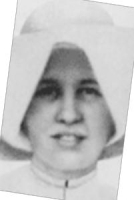
Fifth of ten children born to a pious family. Joined the Daughters of Charity of Saint Vincent de Paul at the San Salvario house in Turin, Italy on 24 September 1883. In 1885 she was assigned to the island of Sardegna; she spent most of her life ministering to the poor there.
In June of 1899 she became the director of the Sassari orphanage, and spent her free time teaching catechism to the poor, the illiterate, and the daughters of rich people whose children went to fine schools with no religious education. She encouraged Eucharistic Adoration, supported the Associazione dei Figli di Maria (Association of the Sons of Mary), and was director of the Associazione delle Figlie di Maria (Association of the Daughters of Mary).
From 1910 to August 1914 she was recalled to Turin to serve as provincial administrator and then as director of the seminary, but her superiors finally understood the level of work she had done in Sardegna, and returned her there. Though the civil government had become decidedly anti-clerical, she continued her good work, and even opened a School of Religion for young people. Worked with sick infants and children at the Marina Colony of the Poetto for several years, and turned part of the building into a hospital for wounded soldiers during World War I.
During the whole of her time on the island she worked whenever possible with the Monelli di Maria (Urchins of Mary), children who were orphaned, homeless, abandoned, or thrown out of the house by their families. She got them to Mass, taught them catechism, to read and to write, and made sure they learned a trade so they could leave life on the streets. All this was done with the secret admiration of, but the open scorn of, most authorities who did not think such children could be reformed or saved.
18 November 1863 in Casatisma, Pavia, Italy
• 9am on 31 December 1924 in Cagliari, Italy of bronchial pneumonia
• her birth family wanted to bury her next to her parents in Casatisma, Italy, but the people of Cagliari begged that she not leave them, and the family agreed
• in October 1932 her body was moved to the chapel at the Asilo della Marina, Cagliari
• 3 February 2008 by Pope Benedict XVI
• recognition celebrated at the Square of the Basilica of Our Lady of Bonaria, Cagliari, Italy, presided by Cardinal José Saraiva Martins
https://catholicsaints.info/blessed-giuseppina-nicoli/
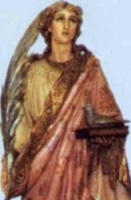
Born to the Spanish nobility. At age 16 she and other Christians fled Spain for Gaul (modern France) to escape the persecutions of Emperor Aurelian. They were located, however, and imprisoned. Legend says that while Columba was in prison, one of the jailers tried to rape her; a bear that was being used at a nearby amphitheatre attacked the guard and rescued her. However, she and the rest of the group were later martyred in the on-going persecutions of Aurelian.
Tradition says that almost immediately upon her death a blind man named Aubertus asked for her intervention and had his sight restored. His first act was to run to her execution site and give her body a decent burial. A chapel was soon built at the grave, followed later by the Abbey of Sens. Other churches in France have borne her name, and in times past she had a strong devotion. This inevitably led to her association with pious fictions and legend.
c.257 in Spain
• beheaded in 273 at Sens, France near a fountain named d'Azon
• relics were enshrined in Sens
• relics destroyed by Huguenots in the 16th century
for rain
• bound maiden standing on a funeral pyre with an angel
• crowned maiden in chains
• maiden being beheaded near a fountain
• maiden holding a book and peacock feather
• dove
• palm
• maiden with a bear on a chain
• maiden with a dog on a chain
https://catholicsaints.info/saint-columba-of-sens/
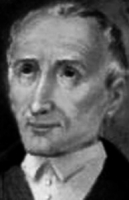
Alain, Alamus, Alanus
3 January (Augustinians)
Born to a noble, pious and patriotic family, Alan wanted to join the Knights of Malta, to serve God while in the military. Instead, however, he became an Augustinian Regular at Chancelade Abbey, Périgueux, France at age twenty. Superior of the abbey in 1623. He worked to restore order and piety to his men, and was so successful that the reforms spread to other local houses.
Bishop of Cahors, France for 23 years from 1636 until his death. There he continued his reforms of the religious houses, and evangelization of his parishioners. Noted for his face-to-face meetings with the laity, Alan visited each of his 800 parishes at least nine times during his espicopate. He held a synod, episcopal council, founded a seminary, sponsored home missions and charities, brought back traditional devotions, and promoted adoration of the Eucharist. Attended the Council of Trent, and followed the lead of Saint Charles Borromeo in enforcing the Council's decrees in his home diocese.
25 November 1593 in the family castle at Belet, Dordogne, France
31 December 1659 at Mercues, Lot, France of natural causes
4 October 1981 by Pope John Paul II
Faith and Valor! - Blessed Alan's motto
https://catholicsaints.info/blessed-alan-de-solminihac/

Wealthy Roman patrician noble; granddaughter of Saint Melania the Elder. Married against her will to Valerius Pinianus (Saint Pinian) at age 13. After the death of their two children, both of whom died young, and to escape Visigoth invasion, the couple fled to Tagaste in North Africa in 410 where they had estates, and where they met Saint Augustine of Hippo. Though they stayed married, the two took vows of celibacy, freed their slaves, sold their lands and goods in Spain and Gaul, and gave the proceeds to the poor. They built two monasteries for Saint Augustine, then the couple moved to Jerusalem and entered a monastery and convent around 417. Friend of Saint Paulinus of Nola and Saint Jerome. Widowed in 432. Directed the convent on the Mount of Olives for several years.
c.383
late December 439 at Jerusalem of natural causes
• against the death of children
• exiles
https://catholicsaints.info/saint-melania-the-younger/
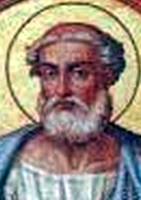
Silvester
Son of Rufinus. Pope in the reign of Emperor Constantine I. Built the Basilica of Saint John Lateran and other churches. Sent legates to the First Council of Nicaea, and was involved in the controversy over Arianism. The spurious Donation of Constantine was supposedly given to Saint Sylvester.
Roman
314
• 31 December 335 at Rome, Italy
• relics transferred to the Church of Saint Sylvester in Capite in Rome in 761
• animals
• for good harvests
• stone masons
• Order of Saint Sylvester
• Calvisano, Italy
• Castroreale, Italy
• Feroleto Antico, Italy
• Poggio Catino, Italy
https://catholicsaints.info/pope-saint-sylvester-i/
Marius Aventicensis
Born to a rich, distinguished family with roots in the Roman empire. Ordained as a young man. Bishop of Avenches, Switzerland in 574; he later moved his see to Lausanne. Participated in the Council of Mâcon in 585. A skilled goldsmith, he made altar vessels by hand. Noted as scholar, a man of prayer, and a protector of the poor. A chronicle of his time has survived; it purports to be a continuation of the Chronicon Imperiale of Prosper Tiro, covers from 455 to 581, and is a key source for Burgundian and Franconian history.
c.530 in the diocese of Autun, Burgundy (in modern France)
• 31 December 594 at Lausanne, Switzerland of natural causes
• buried in the church of St-Thyrse in Lausanne
1605 (cultus confirmation)
• farm tools
• goldsmith tools
https://catholicsaints.info/saint-marius-aventicus/
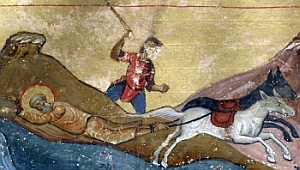
• Feeder of Orphans
• Zotico
Wealthy noble Roman citizen. He first surrendered his position to become a priest, and then gave away his worldly wealth to the poor and lived to work for his parishioners. When Emperor Constantine the Great transferred the capital of his empire from Rome to Constantinople, Zoticus went along. There he built a hospital for the poor and orphans. He preached the orthodox faith against the heretical Arian Emperor Constantius, for which preaching he was martyred.
Italy
dragged through the streets of Constantinople behind a wild ass c.350
poor people
https://catholicsaints.info/saint-zoticus-of-constantinople/
Garembert
Studied with the canons of Sainte-Walpurga, Veurne, Flanders, Belgium. Servant to Mayor Oylard in Saint-Quentin, Cambrai, France. Hermit in Bony, Cambrai. Augustinian monk. Built an abbey in the diocese of Cambrai, France in 1119; he served as its first abbot while his sister served as abbess. In 1136 the house moved to Mont-Saint-Martin and became associated with the Premonstratensians.
1084 near Furness, Belgium
31 December 1141 of natural causes
https://catholicsaints.info/blessed-walembert-of-cambrai/
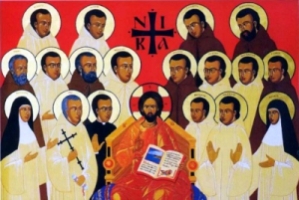
Trappist monk. Martyred in the Spanish Civil War.
13 March 1915 in Hontomín, Burgos, Spain
31 December 1936 in Santander, Cantabria, Spain
• 3 October 2015 by Pope Francis
• beatification recognition celebrated at the cathedral of Santander, Spain, Cardinal Angelo Amato principal celebrant
https://catholicsaints.info/blessed-leandro-gomez-gil/

Sunday after Christmas
Jesus, Mary and Joseph in their relationship as a human family.
• Alto Valle de Rio Negro, Argentina, diocese of
• Reno, Nevada, diocese of
• Tulsa, Oklahoma, diocese of
https://catholicsaints.info/holy-family/
Hermes of Rome
Priest. Exorcist. Martyred in the persecution of Marcus Aurelian.
c.270
• man on horse-back casting a devil out of a woman who is being led by a rope tied around her
• man casting a devil out of a child
https://catholicsaints.info/saint-hermes-the-exorcist/
Sextus, Sextius
Fifth-century bishop of Valencia, Spain. When his city was invaded by barbarians, their leader Chrocus demanded that the people renounce Christianity; they refused, and Chrocus turned his men loose on them. Festus and many of his flock died as martyrs.
https://catholicsaints.info/saint-festus-of-valencia/
Fifth century priest at Antioch (in modern Turkey). While in Rome, Italy on a mission he was befriended by Empress Placidia Augusta who built a monastery for him at nearby Ravenna, Italy. He worked there are superior, and as a counselor to the throne.
https://catholicsaints.info/saint-barbatian-of-ravenna/
Sabinianus, Savinien
First bishop of Sens, France. Martyr. Some legends list him as a disciple of Saint Peter, but because of the dates, this is clearly impossible.
c.300
Sens, France, diocese of
https://catholicsaints.info/saint-sabinian-of-sens/
Benedictine monk. Priest. Served at the abbey of Kremsmünster, Austria. Austrian Benedictines have always considered him Saint Wisinto but elsewhere he known as Blessed.
c.1250 of natural causes
https://catholicsaints.info/blessed-wisinto-of-kremsmunster/
Clerk of the Hagia Sophia church in Constantinople. Reluctant bishop of Ohrid, Macedonia, serving for 25 years. Noted theologian and orator; many of his homilies and commentaries have survived to today.
1126
https://catholicsaints.info/saint-theophylact-of-ohrid/
Benedictine monk. Abbot of the monastery of Subiaco, Italy. Blinded and imprisoned by the baron of Monticello for defending the rights of his abbey. He died in prison, and is considered a martyr.
1003
https://catholicsaints.info/blessed-peter-of-subiaco/
Second bishop of Sens, France. Martyr. Some legends list him as a disciple of Saint Peter, but because of the dates, this is clearly impossible.
c.300
Sens, France, archdiocese of
https://catholicsaints.info/saint-potentian-of-sens/
• Pinianus
• Valerius Pinianus
Married to Saint Melania the Younger. Father of two; both children died very young. About 410 the couple left Rome, Italy, and each entered religious life. Monk.
c.438
https://catholicsaints.info/saint-pinian/
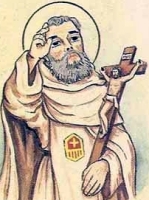
Mercedarian preacher and evanglists working from the convent of Santa Maria in El Puig, Spain.
https://catholicsaints.info/blessed-dominic-de-cubells/
Fifth-century monk in Palestine. Opposing the Monophysite heresy, he was expelled from his monastery.
https://catholicsaints.info/saint-gelasius-of-palestine/
Benedictine nun and abbess at Saint Peter's convent, Benevento, Italy.
c.1070 of natural causes
https://catholicsaints.info/saint-offa-of-benevento/
A group of early Christians martyred together, date unknown. The only other information to survive are ten of their names - Attalus, Cornelius, Fabian, Flos, Minervinus, Pontian, Quintian, Sextus, Simplician and Stephen.
Catania, Sicily, Italy
https://catholicsaints.info/martyrs-of-catania/
A group of Roman women martyred in an early persecution, date unknown. We known the names of ten of them - Dominanda, Donata, Hilaria, Nominanda, Paolina, Paulina, Rogata, Rustica, Saturnina and Serotina.
relics enshrined in the catacombs of Via Salaria, Rome, Italy
https://catholicsaints.info/martyrs-of-rome-31-december/
• Donatus of Rome
• Elisabeth Radermecher
• Eustadius of Bourges
• Gwynin ap Helig
• Zeno of Rome
CatholicSaints.Info Portable Edition